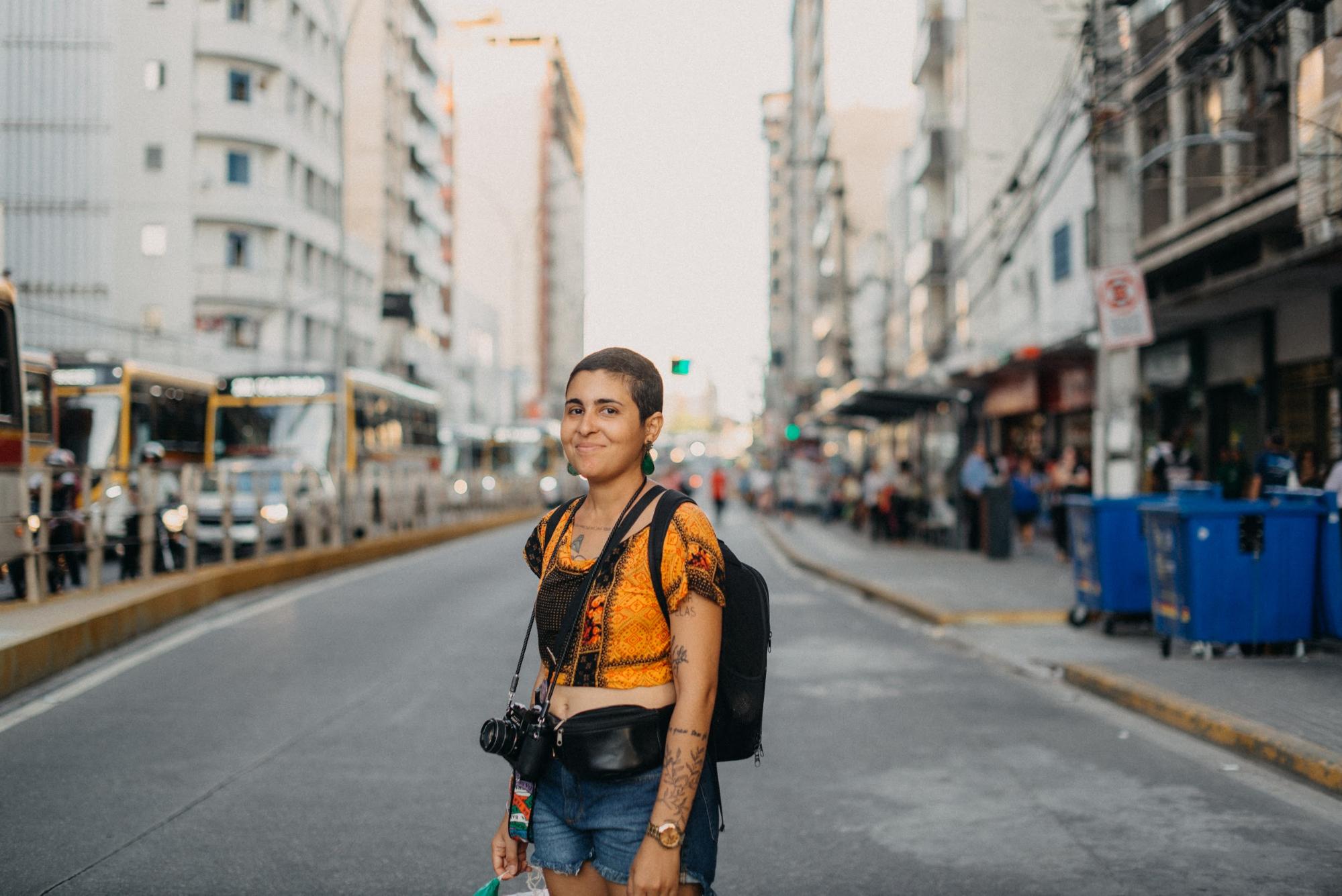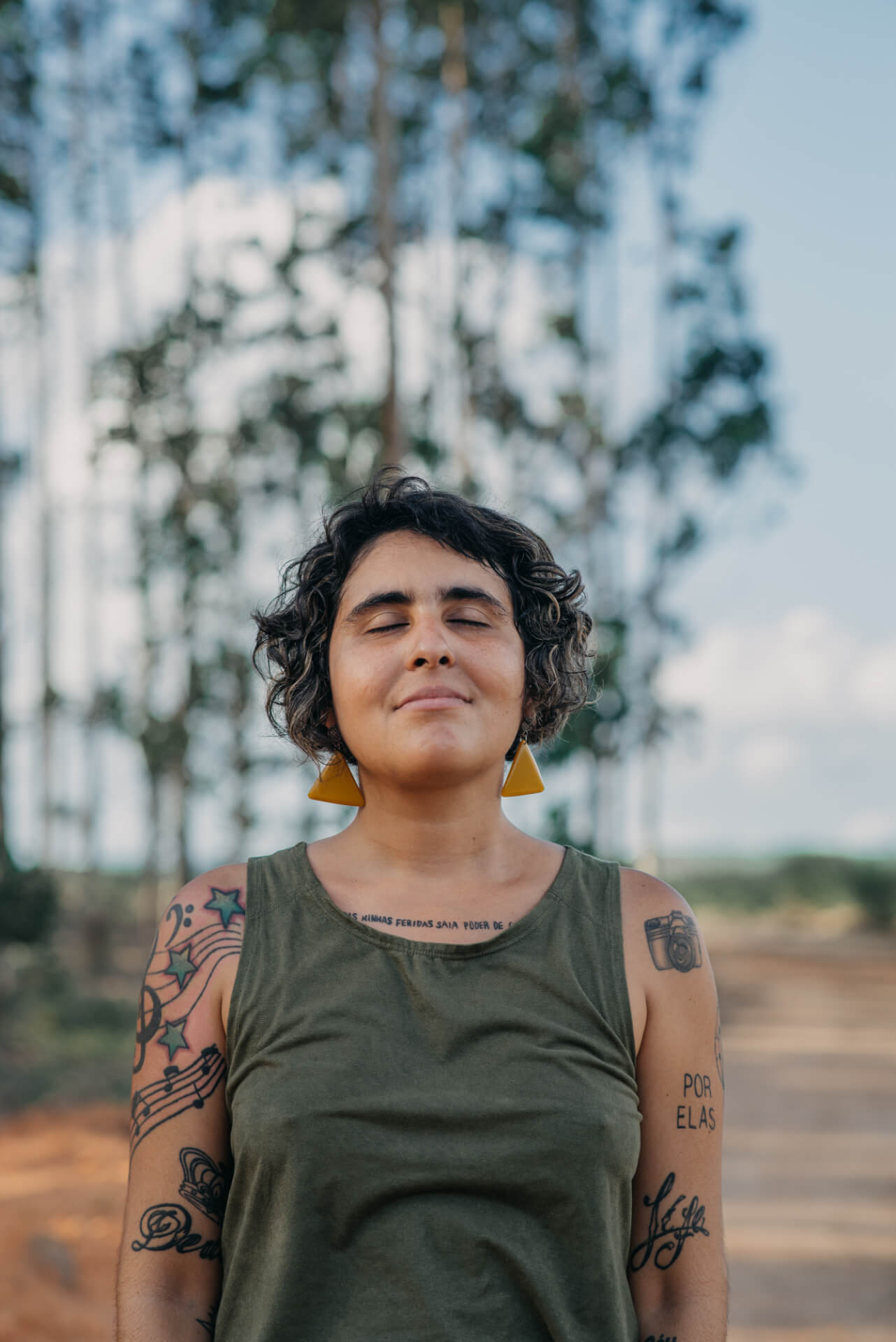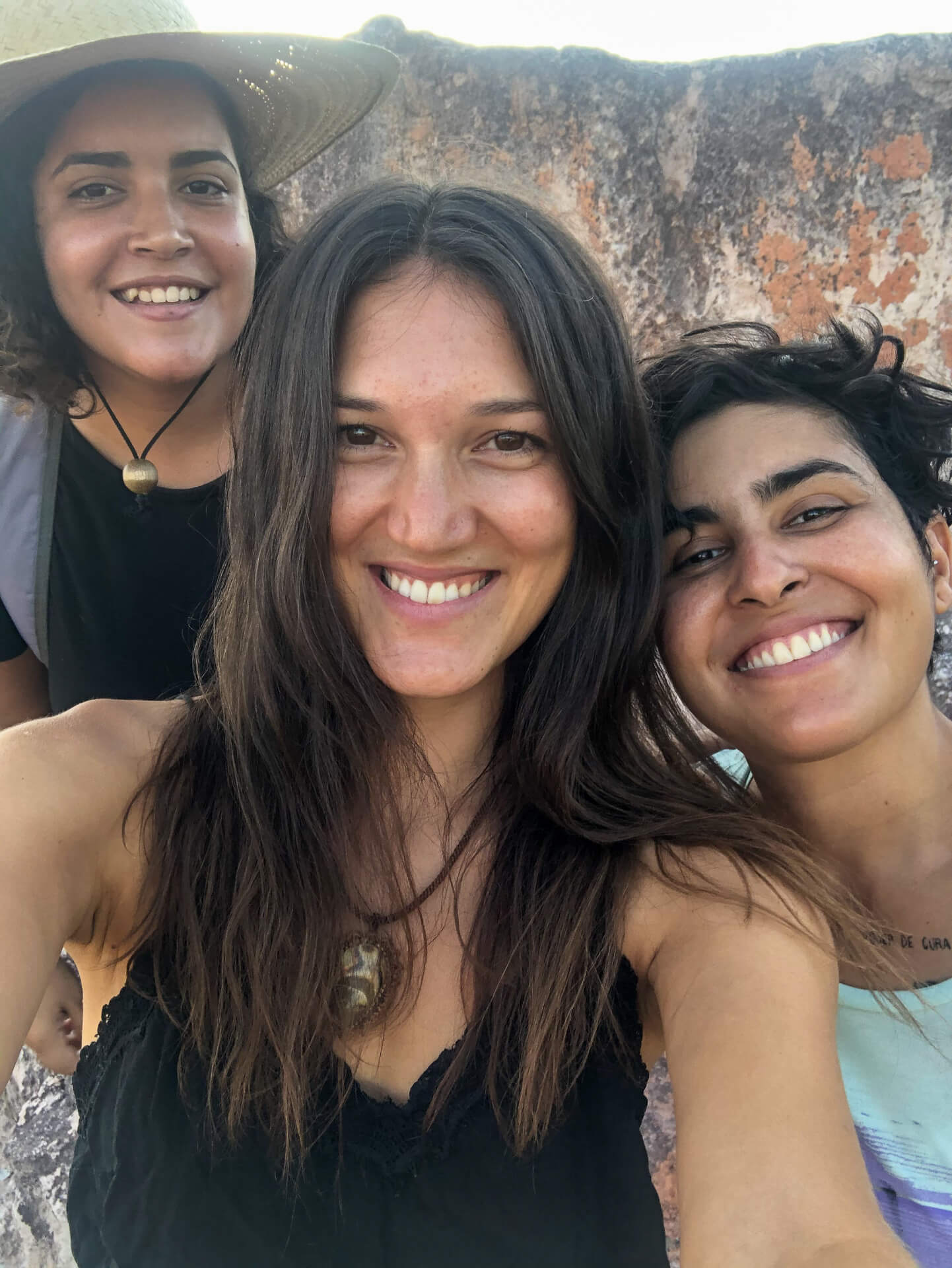I have to admit that I am a little bit nervous when I meet Céu and her partner in the central square of Lençóis, a little town in the mountainsides of Bahia. We were heading to a place that Céu had discovered only recently. A place not far from the town, but in the midst of nature; a spot where we would be safe and unseen.
Meet Brazilian Photographer Céu Albuquerque

I had met Céu two days earlier when I was having dinner with another traveler. She passed by, stopped at our table, and told us about her photography project “Por Elas”. Por Elas turned out to be a collection of polaroids portraying aesthetic nude photography of women. She says it is a therapeutic project in which she takes pictures of women as natural as can be – without clothes and in the wild nature of Brazil.
During our walk through the midday heat, I hesitantly ask Céu about her life story and how she created Por Elas. Céu does not shy away from telling me her experiences: As a baby, Céu was medically diagnosed with Congenital Adrenal Hyperplasia (HAC), a genetic disease characterized by disorders in the functioning of the adrenal glands. This triggers the lack of production of adrenal hormones responsible for maintaining the level of sugar in the blood and the conservation of water and salt in the body, among other functions.
Another characteristic of HAC is intersexuality. As a one-year-old, Céu underwent a feminizing genioplasty that caused her to suffer from self-acceptance problems and periods of heavy depression throughout her life.
It was Céu’s experiences that inspired her to found Por Elas. Essentially, photographing women in a completely natural state gave her the strength to fight her depression and regain her own power.
Finding Power in Feminine Beauty
After walking a while, we find a strip of woods, the trees offering us shade against the heat of the sun, and we sit down. Before we start our photography session, Céu asks me about my personal story, why I was there, what I was expecting from this session and what makes me feel insecure about myself.
I tell her that I often struggle with my female sexuality and nudity. I perceive both as positive energy and I am not ashamed of it. However, many times, others make me feel insecure about showing my nudity by sexualizing it. On the other hand, being vocal about female desires is simultaneously being oppressed.
Céu understands exactly what I mean. The way she talks to me and the patience she offers are both wonderful. It isn’t long before I feel really safe taking off my clothes and letting her take pictures of me in the wild, mother-naked.
Being an intersexual woman, Céu has made it to her purpose to fight for a space of visibility in the world. She says, “It has always been difficult for me to accept my body because of my excessive thinness and the unnecessary genital mutilation I have suffered. After a strong depression, which lasted six months, I found a reason to move on in my photography journey.”

Por Elas became a healing process for her as a cyclical woman. At the same time, it grew as an opportunity to heal other women — trans women, cis women, older women, younger women — as we all are.
We start taking photos: me leaning against a tree, sitting on the wooden ground, next to tiny insects, amidst tropical leaves and limbs of trees. As Céu promised me before we started, our photoshoot feels fluid and easy. I forget to think about being naked and, instead, I start moving around in a light-hearted way.
“There are a lot of women who arrive insecure of how the rehearsal will go and how it will flow,” Céu says. “At the end, most see that it was a very nice experience, very fluid, very quiet, and always very natural. For me, it is important to photograph according to how each woman’s body works.”
If the model is a dancer, Céu explores her movements in nature. If there is a branch of a tree, she encourages her model to pick it up. The photography develops only on that day, according to how a person feels. A pre-determined pose does not exist, and her nice words reassure me to move confidently and to not hesitate about my looks.
In her opinion, only in this way can the photos become a beautiful record of a unique moment. “A photograph made with love captures exactly all the details, which may have gone unnoticed for so many years,” she says.
Offering Healing Through Art
Every woman she has photographed contributed to making Céu who she is today. Often, women come from abusive relationships, some have been rejected by their family and by society. She has met women struggling with self-acceptance and loving themselves; she has photographed women who are hurting. Each story brings a little bit of healing. By sharing our own stories, we empower each other.
Céu mostly aims to help women through that struggle with their self-esteem. “The photographic project opens our eyes to look at ourselves in a different way,” she says. “I believe that through my photographic perspective, the act of portraying a woman, or let’s say me photographing you, I am not only photographing your outside, but I am also photographing your inside. A woman that surely exists there and that you may never have seen.”
Undressing is something that is very difficult for most of us. It is especially difficult to take off our clothes and be naked in front of someone we barely know. I undressed within the very first moments of this experience and felt a moment of exposure. But as we go along, I feel safe, calm, and secure in myself.
Supporting Women Across Latin America
Céu organizes individual sessions like mine, as well as collective rehearsals. Traveling around South America, she sets an agenda for certain cities and invites feminist groups. In the collective rehearsals, the women meet first to talk and share their experiences.
Later, they create a common healing ritual by setting up a bonfire to celebrate and represent the sacred feminine. “We get a very incredible energy among all those women who gather to celebrate their freedom,” Céu explains. “At that moment, we participate and receive the healing power from one to the other.”
I experience that healing power myself. My personal healing process started with meeting Céu that night; it evolved when we talked about her story and when I shared my own. When I look at the photos she takes of me, I see myself in a different way: My nudity feels natural instead of sexualized or objectified. This perception also comes from the very natural aesthetic that Céu chooses. Each of her photographs creates a feeling of being connected with nature and feminine power.

Over time, Por Elas has become a way to gain power over sexual and female freedom in a country whose political elite is known for its repression, racism, homophobia, sexism, and censorship. In the past few years, censorship within Brazilian society has grown dramatically and made it increasingly difficult for artists to exhibit their work.
According to Céu, artists have been in a constant battle and the persecution of people who work in the nude arts has been growing steadily. “It already starts with the fact that chasing the female nipple is sexualized, while those of men are not,“ Céu explains. “I think that having a project like this is a great political act of resistance. As the repression increases, the internet’s importance as free space for expressing yourself and progressive art grows.”
“From my wounds comes the healing power.”
After our photoshoot, we take our things and slowly wander back to Lençóis. I feel exactly how I was supposed to feel: calm, secure, and confident about myself. Now I truly understand why Céu calls her art a healing process.
Beyond my own experience, I feel impressed by her work, her personality, and her story. As a solo traveler, you always meet many different people, and everyone has a unique story to tell. Céu is one of those acquaintances who inspires me deeply. She is a wanderer herself, connecting and strengthening women’s power in Latin America and beyond. By fighting for people’s rights, her art empowers us and heals us.

Before we hug each other goodbye, I notice her tattoo: From my wounds comes the healing power. She explains to me that every wound of ours, every process of ours, everything we have been through, has healing power. When we share our experiences, we can overcome them. She smiles and says, “Through the wounds enters light. That’s it.”







